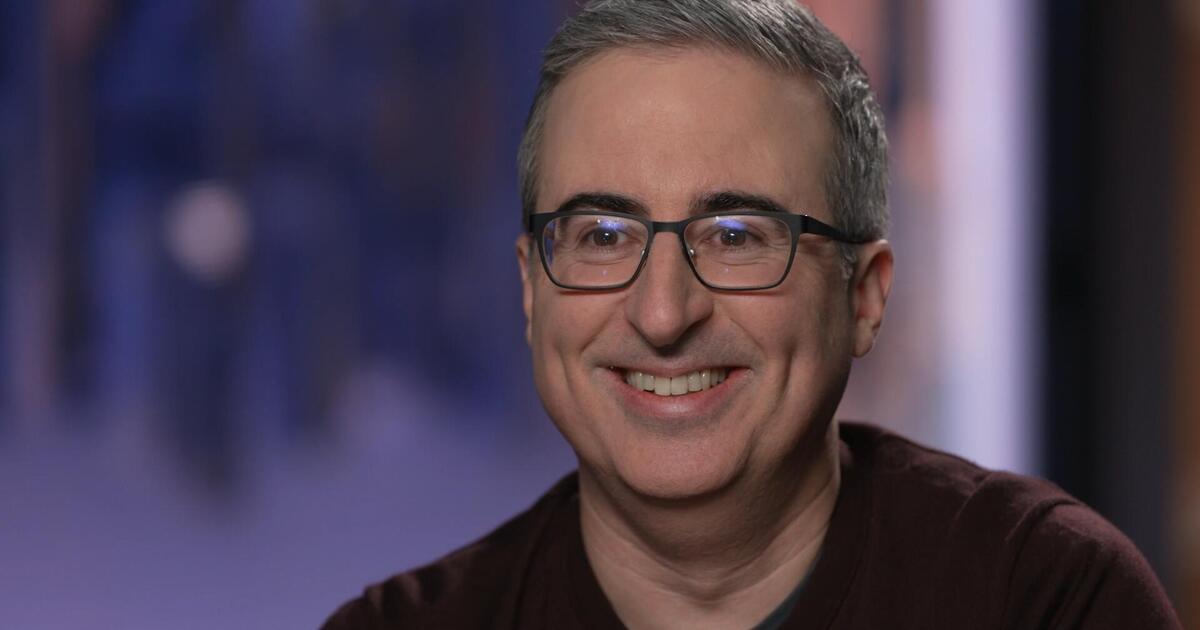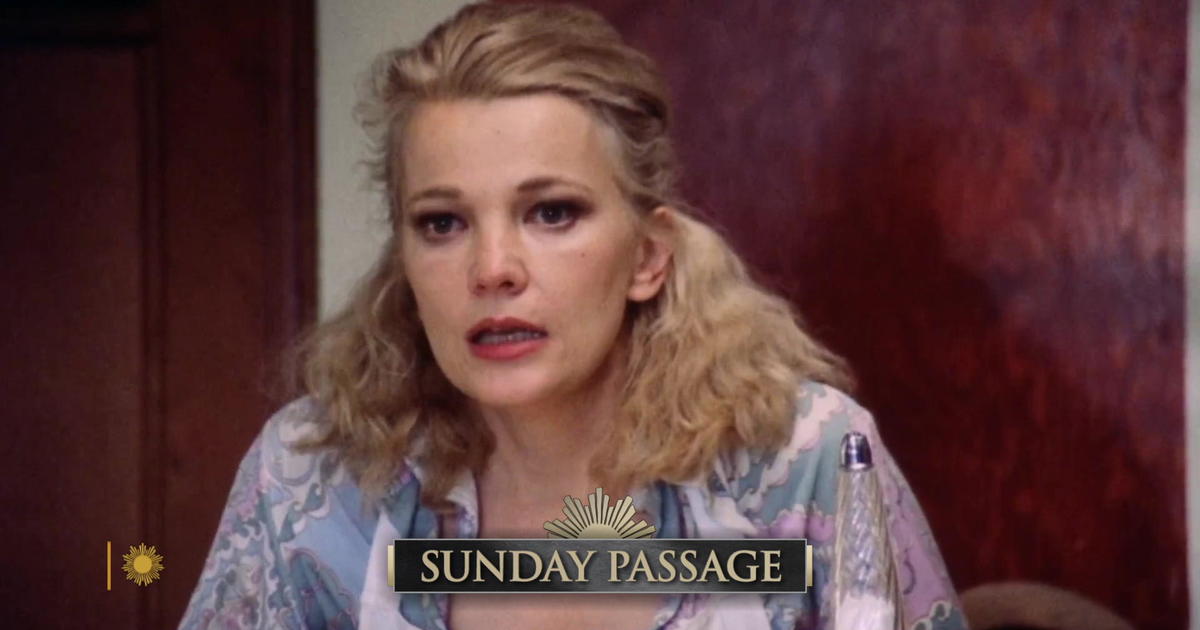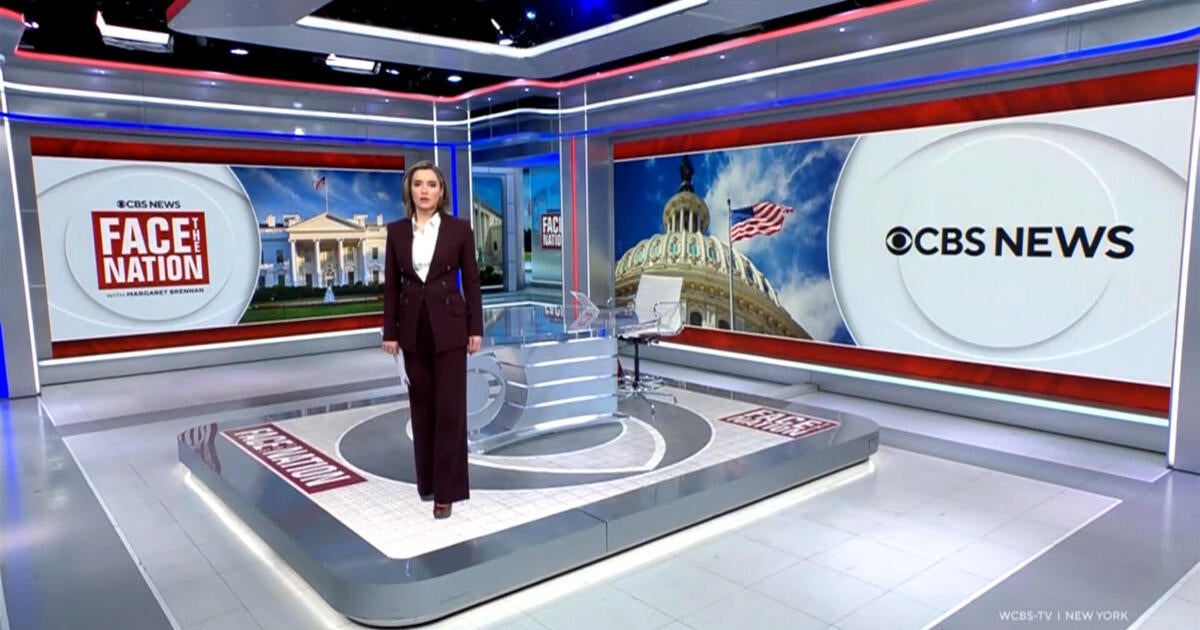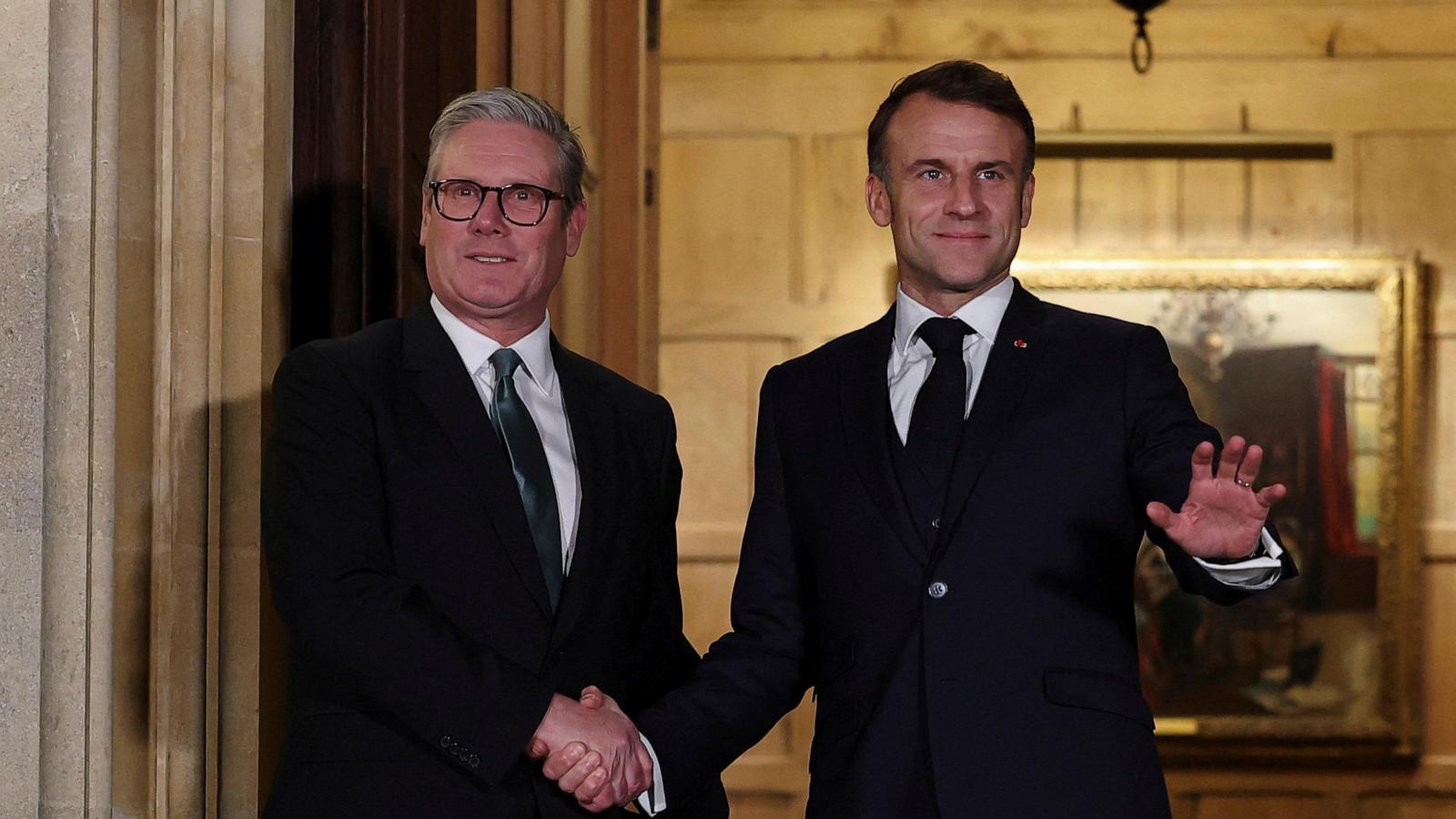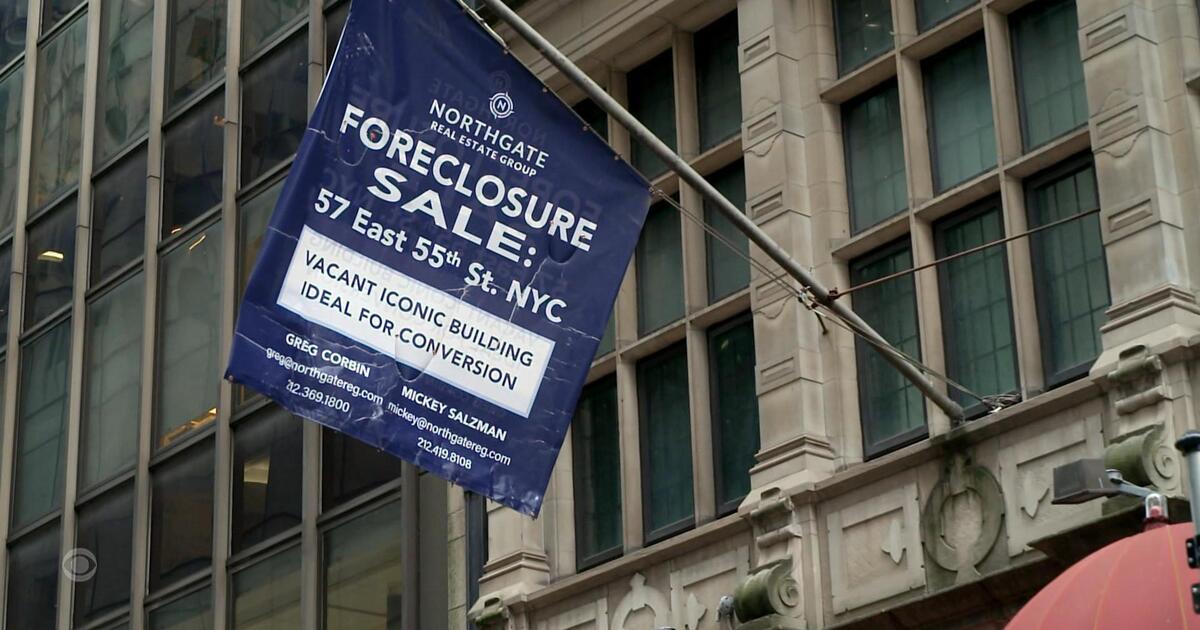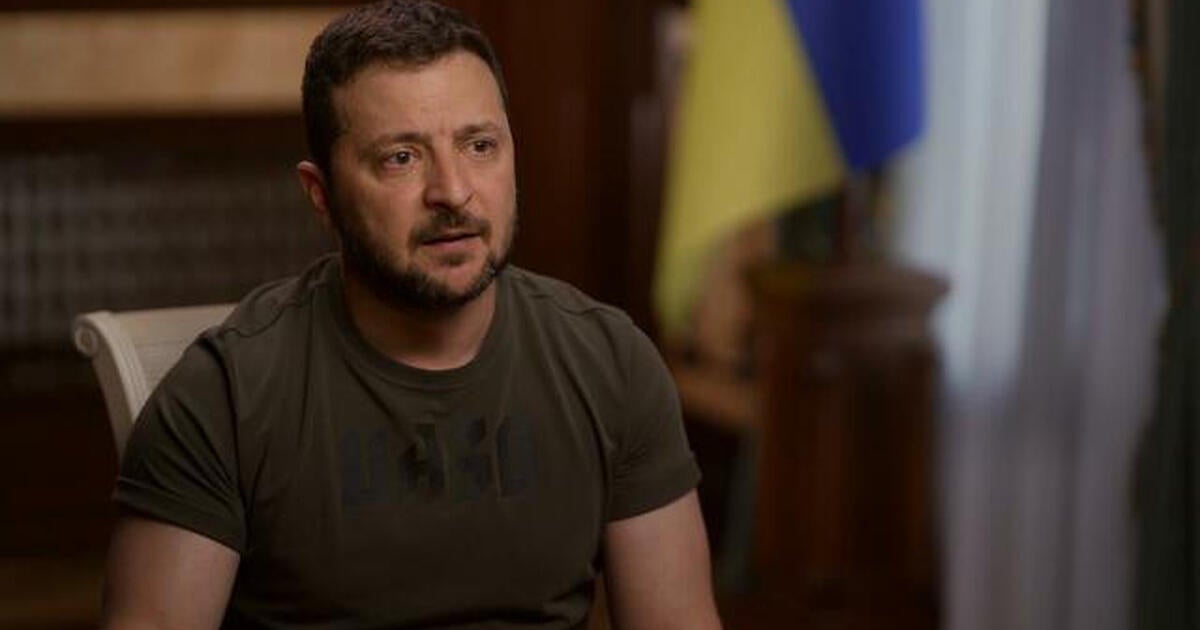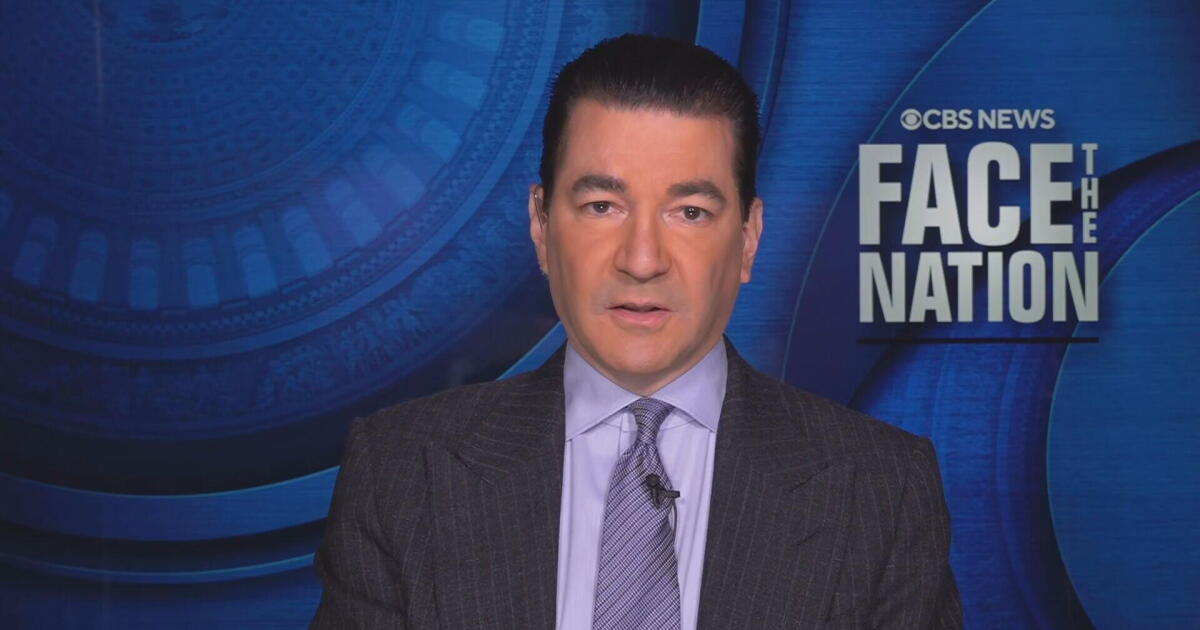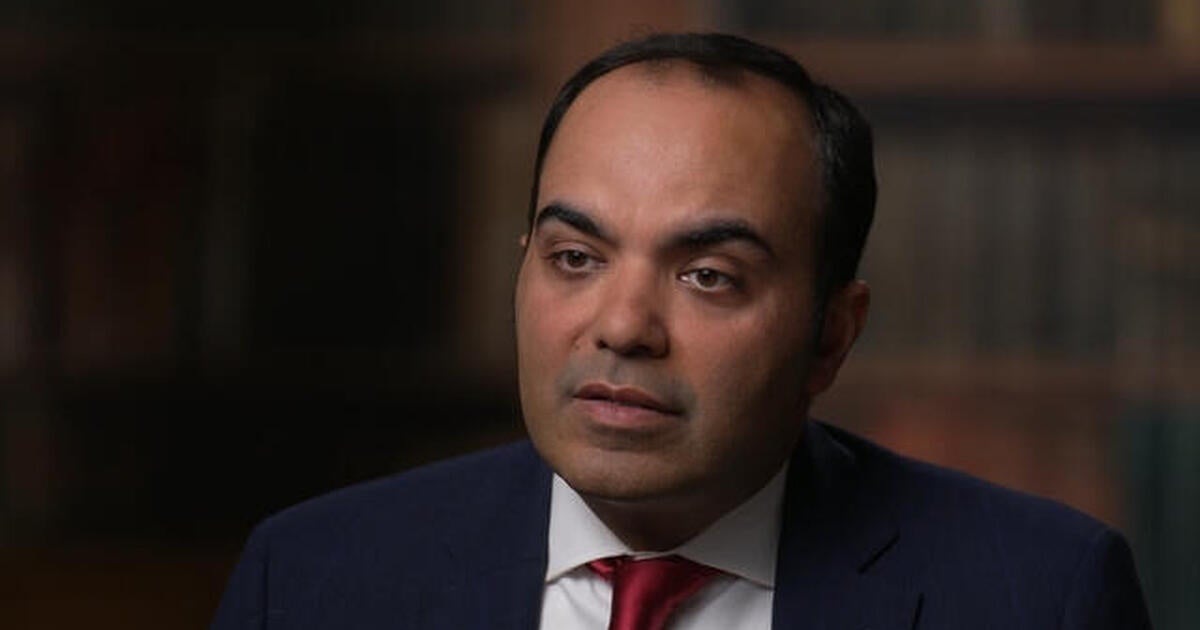John Oliver: The 60 Minutes Interview
At 47 years old, comedian John Oliver has won 21 Emmy awards, three Peabodys, and was named one of Time Magazine’s 100 most influential people. He’s earned the accolades for his unique brand of meticulously researched political humor. His Sunday night show, “Last Week Tonight,” is now in its 12th season on HBO, giving him a perch to unleash searing, satirical takes on America, his adopted homeland. So how did a British-born, middle-class, grade school cut up become one of this country’s sharpest comedians? We traveled near and far to find out.
This past summer, we returned with John Oliver to his comedic launching pad – Edinburgh, Scotland, where modern life is set against a medieval backdrop.
Bill Whitaker: So tell me about this place.
John Oliver: Well, as you can see, this is controlled mayhem.
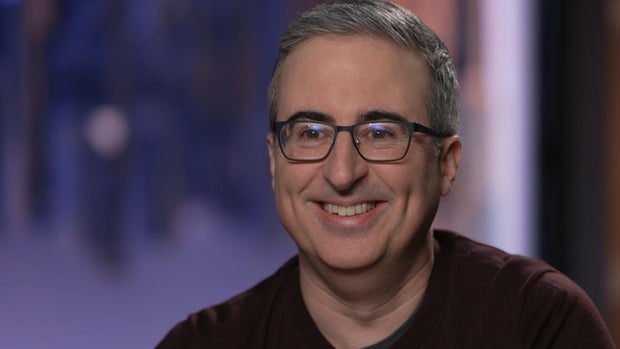
60 Minutes
Every August, the city hosts the world’s largest performing arts festival — a month-long free-for-all known as the Fringe. Artists from 60 countries perform nearly 4,000 shows. No act is turned away.
John Oliver: Some of it will be great. Some of it will be otherworldly bad. But the fact that the two can exist concurrently is kind of the point.
The fringe is a magnet for comedians. As a 20-year-old studying English at Cambridge University, John Oliver felt the pull. He went and tried his hand at stand up.
John Oliver: And I remember walking offstage thinking, “Oh boy, I wanna do that again right now.”
Bill Whitaker: Almost sounds like it’s addictive.
John Oliver: Oh it’s– absolutely addictive.
He came back year after year and headed to the Royal Mile, a picturesque cobblestone street that turns into a competitive marketplace for attention.
Bill Whitaker: Were you doing this?
John Oliver: I was absolutely doing this. When you’re first coming up here, the only way to do it is to almost beg for people to come and see you.
He doesn’t have to beg people any more. He was welcomed with open arms at this basement club where he cut his comedic teeth.
John Oliver (during stand-up): I want you to know that I’ve befouled this stage so many times before, there’s no guarantee this will go well.
He told us he learns from his mistakes and, starting out, he made a lot of them.
John Oliver: It’s the best place–
But nowhere worse than at this tiny, 55-seat venue called Pleasance Below.
John Oliver: This room was in many ways my comedic Waterloo.
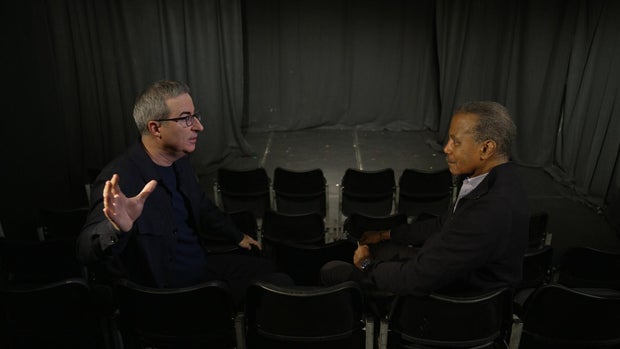
60 Minutes
Bill Whitaker: Did you fill all the seats?
John Oliver: All of this was empty– apart from those four seats and I thought, “Fine, that’s fine. I can do an hour to four people.” And that was my intention going in. (laughter)
But his plans went awry. About 10 minutes in, two people walked out, then a third, leaving one woman … alone.
John Oliver: I saw her hand slowly move down to her bag. And I said to her, “Are you leaving?” And she said, “Yeah, I– yeah, I think I’m going to.” Got up, walked out and it’s just me and a sound technician in the room. And he said, “Do you wanna keep going.” I– I said, “No, I think we’re done here.” And also when you say, “Do you wanna keep going?” “Do you mean this show or this career? Certainly it feels like I’ve got some decisions to make.”
He decided to stop going for the easy laughs.
John Oliver: When I started off I just wanted to make people laugh. Then I wanted to make people laugh about things I cared about. And for me that was politics in its broadest form.
Bill Whitaker: Did it f– feel like a risk at the time?
John Oliver: It felt like a risk worth taking.
And it worked. On his weekly HBO show taped in New York City, his unique take on politics and intrinsic problems is what sets him apart from just about every other comedian on TV.
He delights in revealing the absurdity in the obscure — always, we noticed, with a twinkle in his eye, and a mischievous smile.
John Oliver: Our main story tonight is the threat of nuclear annihilation.
Bill Whitaker: You tackle topics: hospice care, bail reform, organ donations. It’s not your typical comedy fare.
John Oliver: No. I know those don’t sound funny, but it’s because fundamentally, they’re not. But there are funny things about how entrenched some of those problems are. And sometimes I think comedy is the best, most illuminatin’ way to talk about them.
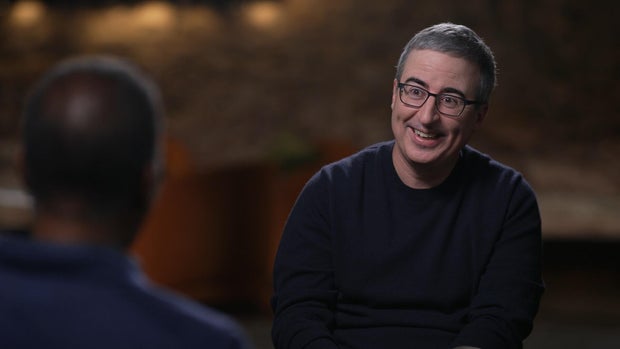
60 Minutes
John Oliver has been making people laugh since he was a kid in the suburbs of Birmingham, England. His dad was a school principal, his mom a music teacher. Young John excelled as the class clown. Later, as a young comedian, he couldn’t get enough of “The Daily Show.”
So in 2006, he sent a sample of his work and was called in to try out.
This is the audition tape. On Oliver’s first trip to New York, he riffed with Jon Stewart about the time Vice President Dick Cheney shot and injured a friend on a quail hunt.
John Oliver: I’m sure right now those birds are laughing maniacally at us in one of those little coveys of theirs.
Jon Stewart: I don’t- I don’t- I don’t think birds can- can laugh, John.
John Oliver: Well, whatever it is that they do do then. Warble. Tweet. Coo. They’re, they’re they’re coo– they’re cooing at us right now, Jon…
He was hired on the spot and, over the next seven years, showed his range. In 2013, Jon Stewart stepped away to direct a movie, and tapped John Oliver to step in.
Bill Whitaker: Was that kinda like taking daddy’s car for a joyride?
John Oliver: Oh yeah. That very first day the Edward Snowden news broke. And it was really fun to sit behind the steering wheel and think, “Oh, how fast does this thing go?” Oh, pretty quick, it turns out.
His turn at the desk caught the eye of HBO, which gave him carte blanche to create his own show. He asked Tim Carvell, head writer at “The Daily Show,” and comedy producer Liz Stanton to join him. They were given the 11 o’clock slot on Sunday nights.
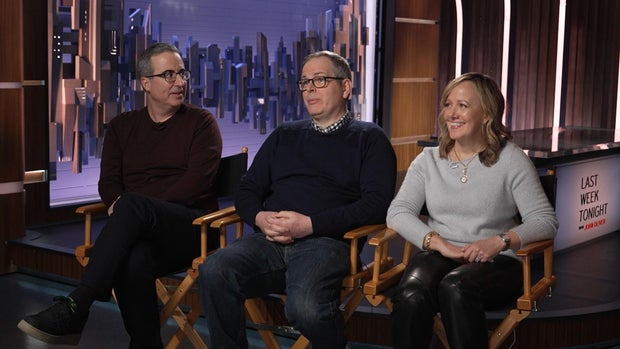
60 Minutes
Bill Whitaker: Did that seem like a gift or like they were– hiding you someplace?
Tim Carvell: No. I mean, we– we were on after “Game of Thrones.” Like, it was — like, it was more of a sense of, “Oh, we– we’re going to let some people down.”
John Oliver: Yeah.
But it’s his take downs that seem to delight him the most.
He pounced on news reports that Supreme Court Justice Clarence Thomas had not disclosed lavish gifts from rich friends and a generous deal on his prized motor coach.
He offered Thomas a new motor coach, plus $1 million a year out of his own pocket if Thomas would resign from the Supreme Court.
Thomas’ lawyer says the justice met the terms of the RV agreement and any other omissions were strictly inadvertent.
Bill Whitaker: You seem to have few limits– on how far you’ll go to get a laugh.
John Oliver: With Clarence Thomas, the main point with that we’re saying that there are not enough guardrails on people giving them money. I can prove that to you by offering this guy a million dollars a year to get the f**k off the Supreme Court. That should be a crime. The very fact that it isn’t is a problem. And that felt like the most visceral way to prove that fact.
Facts are fundamental to Oliver’s humor.
His deep dives into serious topics are painstakingly crafted.
Bill Whitaker: I’ve seen your show described as satirical journalism, investigative comedy. How would you describe it?
John Oliver: In general, it is just a rigorously researched comedy show– both because we want it to be right, and for self-preservation purposes. We don’t wanna be sued into oblivion.
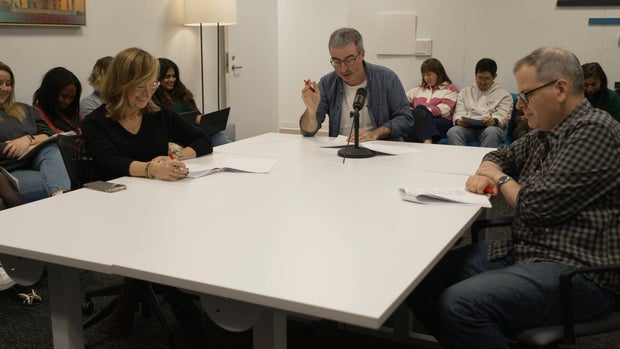
60 Minutes
Oliver’s staff of 83 includes former journalists as well as comedy writers. They churn out 30 shows a year. It starts with this: hundreds of pages of research on each main story.
Oliver, Carvell, and the writers turn those into outlines and then a script, which is tested at a table read.
John Oliver (During table read): I do not want to see a headline tomorrow that says John Oliver blasts expensive detention camps.
On taping day, we watched them rehearse.
John Oliver: But there are much more humane ways to do that and even–
Make last minute changes, and get signoff from the lawyers. Finally, it’s showtime.
Liz Stanton: There’s a little bit of bated breath when he says the – “Tonight’s story is.” Like, you know, they’ve been waiting for maybe a year to come to the show. And they’re gettin’ a real dark one.
John Oliver: Like you’ve lined up in the cold. You’ve maybe taken a flight, and you’re being told, “The main story is organ donation.” It’s like oh–
Bill Whitaker: And this is my trip to New York.
Liz Stanton: Yeah.
John Oliver: That’s right.
Liz Stanton: Have a nice dinner.
To balance things out, Oliver likes to close the show with something zany.
The productions are Stanton’s department.
Liz Stanton: I try and do to my best ability anything we can do to make something happen just ’cause we love the dumb. The dumb stuff is stuff we all love to do.
Bill Whitaker: Some of the– segments are pretty elaborate.
John Oliver: Yeah.
Bill Whitaker: They can’t be cheap.
Liz Stanton: We don’t talk about that.
John Oliver: We don’t talk about that. They’ll never find out how much any of it costs. We’re- we’re cheaper than dragons. As far as we’re concerned, that’s the financial bar.
Oliver has devoted fans and passionate critics. He takes aim at both sides of the aisle.
Bill Whitaker: Last season, you told your viewers, “Do not vote for–“
John Oliver: Yes.
Bill Whitaker: –“Donald Trump.”
John Oliver: Absolutely. I’m not gonna sit here and say that that is not a partisan thing to do, to say, “Don’t vote for Donald Trump.” I think it’s good advice.
Bill Whitaker: But more than 77 million people voted for Donald Trump. Does your show speak to them?
John Oliver: I really hope it speaks to some of them, yes, because most of those main stories that we talk about are not actually party political. Those are lasting problems that have been there before the last two or three presidents, and may well be there for– after the next two or three.
Though he highlights America’s shortcomings, he told us he fell in love with this country as soon as he immigrated. He’s now a U.S. citizen who fell for an Iraq War veteran.
John Oliver: I married someone who’s very American, yeah. She was a medic in the– in the U.S. Army. And now we’re married with two American kids.
Bill Whitaker: You do love to poke fun at America.
John Oliver: Yeah.
Bill Whitaker: Does it trouble you that some people think that criticizing this place means you don’t love it?
John Oliver: Yeah. I mean, I just think that’s utterly absurd. I think you can criticize something because you love it. Because you love it and you want it to get better.
John Oliver: That’s our show–
He told us, in his personal life, he’s risk averse. But when it comes to comedy, John Oliver loves to stir up trouble.
Bill Whitaker: So if you were to look into your crystal ball, what’s next?
John Oliver: Other than– living in the president’s gulags in the future? That’s what my crystal ball is showin’ me right now. What’s next? I’ve no idea. Hopefully, just more of this.
Bill Whitaker: Keep doin’ what you’re doin’?
John Oliver: Yeah. It’s so fun. I can– it’s incredibly hard, not infrequently stressful, but it’s really, really fun. As long as America has systemic problems, we’ll be there poking fun at them.
Produced by Marc Lieberman. Associate producer, Cassidy McDonald. Broadcast associate, Mariah Johnson. Edited by Mike Levine. Assistant editor, Aisha Crespo.

